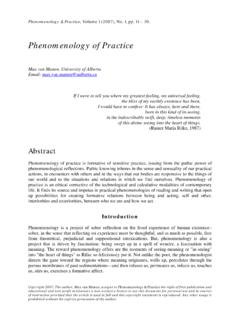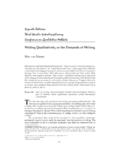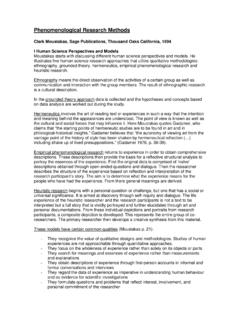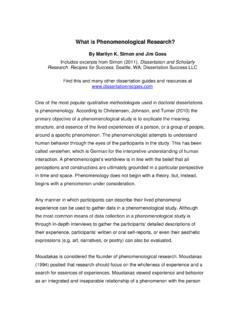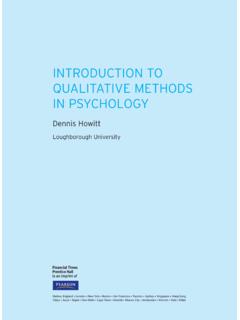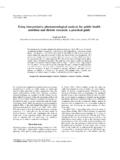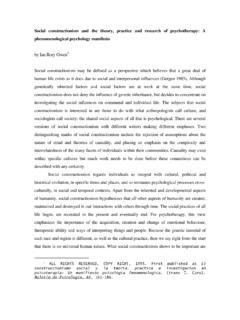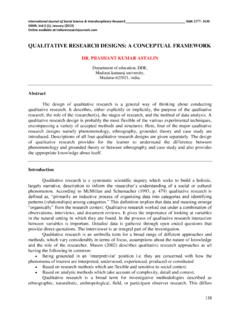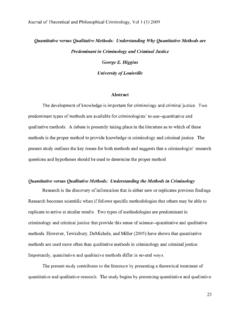Transcription of WHAT IS PHENOMENOLOGY? - maxvanmanen.com
1 what IS phenomenology ? MOMENTS by Will Hoffman Inspired by David Eagleman s book SUM what is a Moment? what is phenomenology ? phenomenology is the philosophical name for the method of investigating or inquiring into the meanings of our experiences as we live them. The method is phenomenological reflecting on pre-reflective or lived experience Any experience whatsoever can be studied phenomenologically The approach is called phenomenological reflection because it uses the method of the epoch and the reduction Lived experience is prereflective in that it is experience as we are in it, live through it while not, or not yet, reflecting on it, or making sense of it, or theorizing about it.
2 The phrase phenomenology of practice refers to the kinds of inquiries that address and serve the practices of professional practitioners as well as the quotidian practices of everyday life. For example, a thoughtful understanding of the meaningful aspects of having a conversation or a talk together or the experience of interacting online and the kind of contact or closeness we experience through email, texting, or social networks may be of value to professional practitioners as well as to anyone involved in the conversational relations of everyday living.
3 what is phenomenology of practice? what is the Epoch and the Reduction? Epoch means that we must try to enter a space of openness to the experience or phenomenon we are trying to understand in its prereflective sense. Reduction means that, once we have opened ourselves, we try to close in on the meaning of the phenomenon as it appears in our experience or in our consciousness. So, the aim of a phenomenological research project is to arrive at phenomenal insights that contribute to our thoughtfulness and practical tact, by using the methods of the epoch and the reduction.
4 what is a phenomenon? The instant of the Now? It may be helpful to explain that a phenomenon can also be seen as a moment of the experiential Now these are the normal moments of everyday living. We are always in the Now even when we recall a memory, anticipate an event, daydream, or do something routine or creative: we cannot be but in the Now (though without really knowing it). And yet when we try to grasp this experience in the instant of the Now, we are always too late. The present of the Now is always absent already when we try to reflect on it.
5 This is really odd, and yet true. Prereflectively, we are always in the Now, and yet, when we try to capture it (objectify it), we are never in that Now the Now is at best always Just Now an absent presence, and in some enigmatic sense a presence that never was. what is the purpose of phenomenological reflection? And yet, this is exactly what phenomenology tries to do: reflect on or uncover the primal meanings of this absent present moment of the now. For example, reading a story, having a talk with someone, sending an email or a message, listening to a piece of music, and so forth.
6 In the questioning we gain the meaningful understandings. There are no ultimate determinations for the meanings of human existence. what is so wonderful about phenomenological insights is that they can be surprising, deep, unexpected, and yet somehow recognizable but an insight is never final, life is always more complicated and ambiguous that we can express and therein lies the wonder, promise and fascination of phenomenological inquiry. what kinds of questions does phenomenology ask? phenomenology asks originary meaning questions Any experience whatsoever can be a phenomenological topic: phenomenology studies the unique lived meaning aspects of a possible human experience what kinds of questions does phenomenology ask?
7 phenomenology asks originary meaning questions In focusing on a particular phenomenon, it asks: what is this phenomenon like? And how do we need to describe it so that its phenomenological meaning becomes understandable and resonates with our lived experience? How does this phenomenon give or show itself in consciousness? what existential structures of meaning lie at the core of this phenomenon? what makes this phenomenon or lived experience unique and singularly different from other phenomena? 3 what is the philosophical framework of phenomenology ?
8 The framework underpinning this research is rooted in continental philosophy. Philosophy today has become, essentially, phenomenology .. it has undertaken the task of seeing what gives itself what gives.: (Jean-Luc Marion, 2004, p. ix) And as I explained, seeing what gives itself involves reflecting on prereflective life, on lived or primal experience. The framework underpinning this research is rooted in continental philosophy. phenomenology is commonly associated with the thinking and the voluminous writings by Edmund Husserl and Martin Heidegger.
9 But, really we should now recognize that phenomenology has been and is presented or practiced by dozens of fascinating scholars. phenomenology of Practice contains discussions of a few dozen scholar who can give us new ways of understanding the meaning of meaning and the originary sources of meaning. The Lure of the Quotidian Why I love phenomenology or Why is phenomenology good for us? Beginnings: Transcendental phenomenology Husserl Personalistic and Value phenomenology Scheler Empathic and Faith phenomenology Stein Ontological phenomenology Heidegger Personal Practice phenomenology Pato ka Strands and traditions.
10 Ethical phenomenology Levinas Existential phenomenology Sartre Gender phenomenology de Beauvoir Embodiment phenomenology Merleau-Ponty Hermeneutic phenomenology Gadamer Critical phenomenology Ricoeur Literary phenomenology Blanchot Oneiric-Poetic phenomenology Bachelard Sociological phenomenology Schutz Political phenomenology Arendt Material phenomenology Henry Deconstruction phenomenology Derrida New thoughts and unthoughts: Technoscience Post- phenomenology Ihde Learning phenomenology Dreyfus Sense phenomenology Serres Ecological phenomenology Lingis Fragmentary phenomenology Nancy Religious phenomenology Chr tien Philological phenomenology Agamben Radical phenomenology Marion Techno-genetic phenomenology Stiegler Ecstatic-poetic phenomenology Gosetti-Fereince Objectivity phenomenology Figal Eventiel phenomenology Romano phenomenologies what does the methodological frame of



